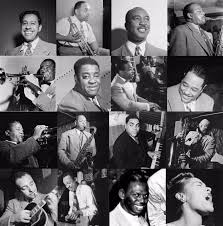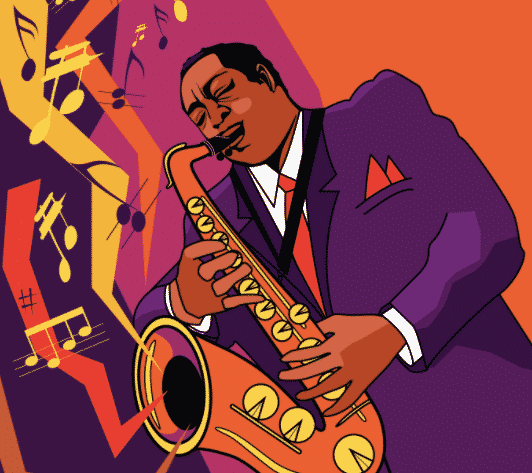The Story of Jazz Notes

- Compared to classical, jazz is upbeat.
- Jazz used to be a sin; sin music and those who played jazz were looked down upon.
- Jazz draws its strength from many cultures; it was African music combined with European music.
- Jazz thrived in New Orleans.
- The grand instrument was the banjo.
- Scott Joplin- ragtime which flourished in the midwest.
- Ragtime was the foundation to Jazz.
- Buddy Bolden became the first jazz legend.
- Louis Armstrong became the metaphor of jazz; he was the father of Jazz.
- Armstrong was known for his phrasing and clarity of tone in the playing of the trumpet.
- Armstrong consolidated all of the elements of jazz music that came before him. He understood all the different aspects of American music.
- Jazz musicians were likely self taught.
- Original Dixieland Jazz Band, performed in Chicago and New York and got credit for starting Jazz.
- It would be 5 years before a Black person could perform jazz.
- Joe king Oliver
- Blues and Jazz in Northern (Chicago) from Southern migrants.
- Lil Harvey- female jazz instrumentalist (hired as a pianist by Oliver)
- Greatest jazz soloist in history- Louis Armstrong. He left King Oliver’s band.
- Louis Armstrong loved Vicks.
- Not only trumpet players were affected by Louis.
- Coleman Hawkins established the saxophone as a Jazz instrument.
- 1925 Orchestra- New Orleans to Chicago.
- James B Johnson created a style: Charleston. He played with one hand, the left hand.
- Duke Ellington- a band leader and composer who contributed to the cultural renaissance; Harlem Renaissance.
- Cotton club
- The Ellington Band institution was placed in its own category of music.
- Armstrong was well known in Europe.
- In early 30s, jazz was taken to countries across the world; such as in France and London.
- Kansas City was the hub of Western and Southern jazz musicians.
- Tenor Saxophone- Lester.
- Clouds of Joy
- Mary Louis was one of the first leading ladies in modern jazz.
- Charlie Parker- orchestra
- Harlem swing was a style of dancing with Jazz music.
- Armstrong’s phrasing was the right way to sing American’s popular music.
- Bessie Smith- empress of the blues; Could be called the first female jazz vocalist.
- Earliest form of jazz is Trad/ New Orleans jazz.
- Ella Fitzgerald- successfully blurred the distinction between jazz and pop; Queen of scat.
- Bop/BeBop- moving and uplifting music, had a natural evolution of culture.
- To most, Bebop was just jazz taken in a new direction. Everyone had their own individual expression in Bebop.
- In the early 40s jazz moved from Harlem to “the street that never sleeps” (52ND STREET)
- Jazz fusion: 1970s
- Munk, Gillespie, Parker, Charlie Christian and others got together to produce a unique form of jazz (Bop).
- Afro-cuban jazz- 1940s; Dizzy Gillespie began a collaboration with Post that brought modern jazz face to face with its roots (Afro-cuban jazz)
- Ornette Coleman made everyone sound like a traditionalist.
- Free jazz- improvisation. Performed by Ornette Coleman to free jazz from restrictions. Mingus organized chaos to make a dramatic point.
- Miles Davis- Birth of the cool.
- Billie Holiday/ Lady Day- her voice had an intimacy; she had charisma. She was extremely modern; Louis Armstrong was her idol. She was a swing singer.
- Charlie Parker had a new approach to playing music.
- John Cultrain- growing a new way of playing. Youngsters got on to it right away, it took awhile for older folks to listen. He played with Miles Davis and would take extended solos. Sounded similar to Charlie Parker on the saxophone. His contributions to jazz are remembered as the most important of that decade.
- Sarah Vaugh- Queen of Bebop; definitive diva. Sounds more like a horn; she had tone and pitch that was unique and distinctive
- Miles Davis- Cool Jazz; trumpet player
- Blues began in the Mississippi Delta.
- Congo Square
- Eubie Blake- Ragtime
- Big 4- count to 4 and get louder on #4; example in Salty Peanuts by Dizzy Gillespie




